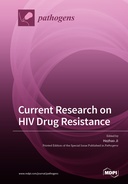Explore

Current Research on HIV Drug Resistance
Hezhao Ji (editor)
2022
0 Ungluers have
Faved this Work
Login to Fave
HIV drug resistance is an unavoidable challenge for HIV/AIDS professionals, and it has long been a major obstacle hindering the global effort to contain HIV/AIDS. Pathogens journal launched a topical collection in 2021 on “Current Research on HIV Drug Resistance”, aiming to catch the latest advancements in HIV resistance diagnosis, surveillance and research. This book compiles all articles published in this collection, combining original research and review articles on HIV drug resistance.
This book is included in DOAB.
Why read this book? Have your say.
You must be logged in to comment.
Rights Information
Are you the author or publisher of this work? If so, you can claim it as yours by registering as an Unglue.it rights holder.Downloads
This work has been downloaded 99 times via unglue.it ebook links.
- 99 - pdf (CC BY) at Unglue.it.
Keywords
- 3′-polypurine tract
- analytes
- antiviral therapy
- atazanavir
- Botswana
- Case study
- complex adaptive system
- Dar es Salaam
- dolutegravir
- drug resistance
- drug resistance mutations
- enrichment
- Epidemiology & medical statistics
- HCV
- HIV
- HIV acquired drug resistance
- HIV drug resistance
- HIV pretreatment drug resistance
- HIV-1
- integrase strand transfer inhibitors
- interrupted antiretroviral therapy
- leverage points
- medicine
- Medicine: General Issues
- Mexico
- Mexico City
- Mutation
- n/a
- Nef
- next-generation sequencing
- Performance
- point-of-care test
- probe capture
- protease
- protease inhibitor
- Public Health
- Public health & preventive medicine
- replication fitness
- resource-limited setting
- Sanger sequencing
- single genome sequencing
- Specimens
- surveillance
- systems mapping
- Tanzania
- Testing
Links
DOI: 10.3390/books978-3-0365-5512-6Editions

